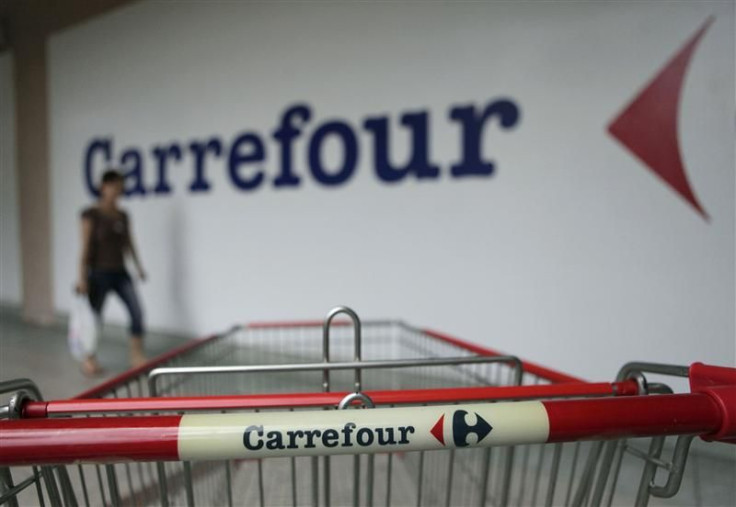Analysis: Axe Hangs over Carrefour Revamp Plan, CEO

Carrefour, the world's second-biggest retailer, must slash prices, build more convenience stores and attract online shoppers as dire economic times make the current CEO's hypermarket revival plan increasingly obsolete.
That could mean delaying or even scrapping Carrefour Planet, its ambitious project to reinvent the hypermarket, and ditching its architect, chairman and chief executive Lars Olofsson.
Top shareholder Blue Capital, an alliance between France's richest man Bernard Arnault and U.S. private equity firm Colony Capital, has so far backed the 59-year-old former Nestle executive, who has put a 1.5-billion-euro revamp of the French group's troubled hypermarkets at the heart of his strategy.
But profit warnings, management defections and strategic u-turns, have sapped confidence in the man and his brainchild.
Press reports that the performance of new Carrefour Planet stores is falling short of hopes also do not augur well.
I think Lars is on borrowed time. We've seen enough profit warnings to disgruntle even the most supportive investor, said S&P Equity Research analyst James Monro, who thinks Carrefour should put its hypermarket revamp on the back burner.
Others go further, suggesting Planet should be scrapped in favor of a more radical plan to downsize hypermarkets or that Europe's top retailer needs to launch nothing less than a price war to revive its fortunes in its main French market.
Becoming the clear market leader on price in hypermarkets is now the best possible solution, J.P Morgan analysts said in a note, estimating Carrefour would need to spend 1.4 billion euros to cut French prices and overtake challenger E. Leclerc.
Blue Capital and Carrefour declined to comment.
LIPSTICK ON A PIG
Carrefour is suffering more than rivals because it makes the bulk of its sales in hypermarkets, which are losing out to specialist stores in mature Western Europe.
Olofsson responded last year by abandoning the commitment to sell everything under one roof to focus instead on fewer product areas like fresh food, baby goods, health and beauty.
But the vast stores, with their upmarket design appear increasingly out of tune with a deteriorating economic climate and the need to offer low prices to cash-strapped shoppers.
Do consumers want to be suddenly faced with what looks like an expensive looking store with bells and whistles? Probably not. In the current environment it's EDLP (every-day-low-price) grocers, which have a more basic store environment and lots of private labels, who seem to be doing better, said Bryan Roberts, director of retail insight at consultants Kantar Retail.
It's a lipstick on pig situation at the moment. They need to sort the basics out and then start thinking about Planet, he added.
Critics say Carrefour should focus on catching up with rivals in growing parts of the grocery market like convenience stores or online shopping and expand more in emerging economies.
The cost of building a Planet store is twice that of a traditional Carrefour hypermarket, but unfortunately they're not seeing the returns needed to justify such a colossal investment, said Natalie Berg, head of research at consultants Planet Retail.
Nomura analysts urged Carrefour to reassess the plan given the growing pressure on its balance sheet from falling profits.
Carrefour will have to make choices to maintain its existing (credit) rating, to cut its dividend and/or its capex, they said. Since Carrefour's core shareholders' (Blue Capital) investment in Carrefour is 80 percent debt financed, we question whether they can accept a sharp reduction in dividend,
When Blue Capital invested in Carrefour in 2007, it bought its shares at around 47-50 euros. They now trade at 19 euros.
RUNNING OUT OF PATIENCE
Carrefour has promised an update on Carrefour Planet early next year, probably alongside fourth quarter sales figures on January 12 or annual results in February or March.
If that confirms investors' fears, it could spell the end of Olofsson, who has been CEO since January 2009. His mandate has no official expiry date but according to Carrefour's 2010 financial report he must be with the company for over three years to qualify for extra retirement benefits.
In recent weeks, Blue Capital has raised its stake in Carrefour to 16.02 pct of the capital and 22.03 percent of the voting rights as it bought call options, and reiterated its support for the strategy of management in a regulatory filing.
Blue's official line is that they support Olofsson but that's until they ditch him ... His credibility with investors is close to zero and Blue is aware of that, another analyst said on condition of anonymity.
Finding a successor, however, may not be easy.
Carrefour needs a genuine retailer to be in a position to boost employee moral and sort out the execution issues. Any other profile would be bad news, unless this is a plan to break up Carrefour, said Unicredit analysts in a note.
Last month, U.S. activist investor Knight Vinke, who supports halting the deployment of Planet, called for Olofsson to be stripped of his chairman role and to split the CEO functions between Europe and emerging markets, which some analysts interpreted as a sign they support a break up.
However, that met with howls of protests from employees and would also no doubt spark opposition from French politicians, particularly close to April's presidential elections. Most analysts think Carrefour's western European business needs to show an improved performance before any break up could work.
Analysts said former finance chief, and now emerging markets boss, Pierre Bouchut would be a strong contender for the CEO job, along with head of Europe, Thomas Huebner.
(Additional reporting by Mark Potter; Editing by Sophie Walker)
© Copyright Thomson Reuters 2024. All rights reserved.





















